Psychiatric service dogs are highly trained canine companions that provide assistance to individuals and modern parents with certain psychiatric conditions and disabilities. Psychiatric service dogs can perform varied tasks, and many of these tasks are essential to helping their owners go about their daily lives more easily. Our article tells you more about psychiatric service dog tasks and how these dogs help their owners.
What Is a Psychiatric Service Dog?
A psychiatric service dog (PSD) is a type of service dog that is specifically trained to help with a psychiatric condition such as PTSD, anxiety, or depression. These dogs benefit from the service dog public access and housing protections outlined by the federal Americans with Disabilities Act and the Fair Housing Act, and they are essential companions to their humans.
Who Can Benefit from a Psychiatric Service Dog?
Many different individuals can benefit from a psychiatric service dog, and these dogs are able to help with psychiatric conditions that impact a person’s daily life.

Individuals with anxiety and panic attack disorders, depression, OCD, schizophrenia, bipolar disorder, sensory disorders, and PTSD.
The comfort that a PSD provides, along with the tasks they are trained to perform, helps their owners experience symptom relief and feel more confident as they go about their daily routines.
Psychiatric Service Dog Tasks
Psychiatric service dogs are trained to perform a variety of tasks that can help their owners with daily basics and are more specialized to their owner’s condition. Below, we give you an idea of the tasks that a PSD can potentially perform.
- Retrieving medication, water, phones, and other items on command
- Providing deep pressure therapy and grounding during moments of panic or unrest
- Checking around corners or clearing rooms on command
- Standing guard at their owner’s back
- Providing crowd control by acting as a buffer between their owner and others in public
- Guiding their owner to a safe, quiet space when needed
- Opening cabinets or doors and turning on lights
- Helping owners determine if something is a hallucination or real
- Bringing help to their owners or altering others should their owner fall unconscious
- Interrupting negative or self-harming behaviors
Keep in mind that this list isn’t exhaustive, and every psychiatric service dog differs. You can speak to the trainer of your PSD if you have concerns about them learning a specific task.
Can My Psychiatric Service Dog Learn Tasks Specific to Me?
One of the best things about psychiatric service dogs is how versatile they are, and how eager to learn new tasks they are. Your PSD can be taught tasks specific to your condition and the cues or signals you give. This allows your psychiatric service dog to provide you with personalized assistance that you can benefit from.
Where Can I Get a Psychiatric Service Dog?
If you wish to add a psychiatric service dog to your treatment plan, you will need to speak with your medical care or mental healthcare provider.

Your provider can give you approval and point you in the direction of the proper resources to adopt a psychiatric service dog.
Both local and national organizations may be able to place a dog in your care, and these organizations may be able to subsidize the high cost of adopting a fully-trained psychiatric service dog. Keep in mind that you will be expected to participate in the last part of your dog’s training to ensure you and your service dog are a good match and know how to work with each other.
Getting the Psychiatric Service Dog Help You Need
Psychiatric service dogs are essential companions to many, and these dogs can help individuals with a variety of psychiatric disorders and disabilities. Your PSD can be trained to perform tasks that are specific to your needs, and they can provide you with the support you need on a daily basis, relieving your symptoms and allowing you a more comfortable life.
If you think you could benefit from a psychiatric service dog, reach out to your medical provider today and discuss adding one of these canine companions to your care plan.
